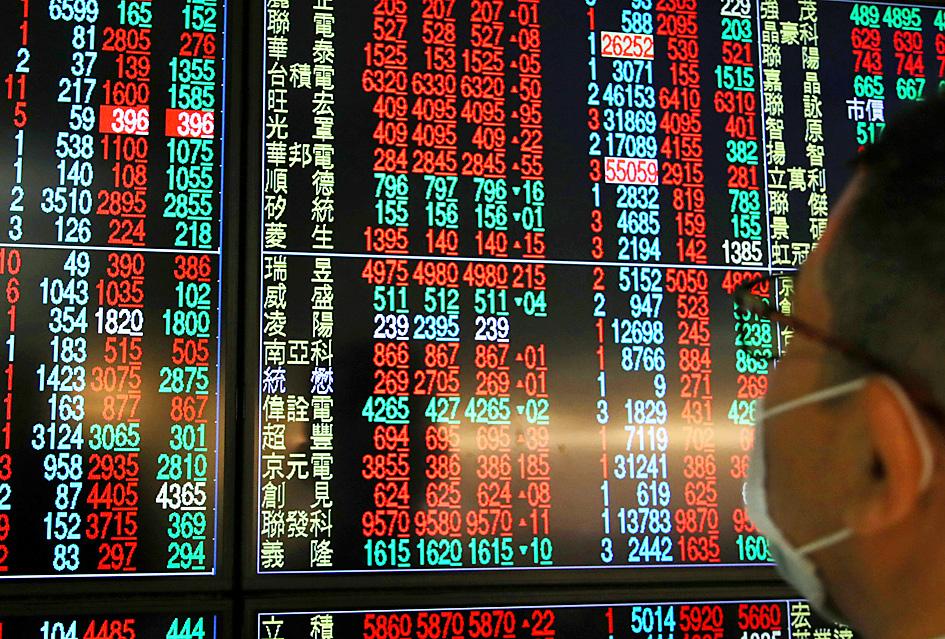Equity investors in Taiwan earned about NT$1 million (US$35,224) on average in the past lunar year, boosted by a 30 percent rise in share prices, Taiwan Stock Exchange data showed.
On Friday, the last trading session in the Year of the Rat, the benchmark index closed at 15,802.40, which is 3,683.69 points, or 30.4 percent, higher than in the last session in the previous lunar year, the Year of the Pig.
Market capitalization increased by NT$11.37 trillion, or 30.92 percent, from a year earlier to NT$48.16 trillion.

Photo: CNA
As of the end of last month, there were 11.28 million investors on the equity market, earning about NT$1.1 million on average in the 12-month period, the data showed.
Despite the COVID-19 pandemic, global financial markets remained resilient, as the US Federal Reserve and other major central banks pumped cash into economies, analysts said.
The spillover effects of loose monetary policies led to strong and sustained fund inflows into Taiwan, they said.
The TAIEX on Jan. 7 surpassed 15,000 points, peaked at 16,153.77 points on Jan. 21 and finished at 15,802.40 on Friday.
The gains were driven largely by contract chipmaker Taiwan Semiconductor Manufacturing Co (TSMC, 台積電), which soared almost 90 percent in the Year of the Rat.
TSMC remained the global leader in high-end technology development, weathering headwinds from the pandemic, analysts said.
TSMC reallocated capacity after it lost orders from one of its major customers, Huawei Technologies Co (華為), due to US sanctions on the Chinese firm, they said.
In the Year of the Rat, TSMC’s market cap rose by NT$7.75 trillion to NT$16.38 trillion, as its shares soared by NT$299.00. Its shareholders earned NT$309,000 for every 1,000 shares, in addition to a cash dividend of NT$10 per share.
TSMC’s gains contributed 2,546 points to the TAIEX’s increase in the past lunar year.
The chipmaker remained the most profitable company in Taiwan, posting a record net profit of NT$517.89 billion, or earnings per share of NT$19.97.
TSMC has forecast a 15 percent sales increase this year, while the average growth in the pure-play wafer foundry industry is projected to be 10 percent.
Among the other companies that contributed significantly to the TAIEX’s gains, integrated circuit designer MediaTek Inc (聯發科) posted NT$41.44 billion in net profit, an annual gain of 78.6 percent, driven by increased shipments of 5G chips.
In the Year of the Rat, MediaTek shares soared NT$531 from a year earlier to close at NT$950, with its market cap increasing by NT$844.29 billion. Its shareholders earned NT$541,500 for every 1,000 shares, in addition to a cash dividend of NT$10.5 per share.
Trading on the local equity market is to resume on Wednesday next week.

NEW IDENTITY: Known for its software, India has expanded into hardware, with its semiconductor industry growing from US$38bn in 2023 to US$45bn to US$50bn India on Saturday inaugurated its first semiconductor assembly and test facility, a milestone in the government’s push to reduce dependence on foreign chipmakers and stake a claim in a sector dominated by China. Indian Prime Minister Narendra Modi opened US firm Micron Technology Inc’s semiconductor assembly, test and packaging unit in his home state of Gujarat, hailing the “dawn of a new era” for India’s technology ambitions. “When young Indians look back in the future, they will see this decade as the turning point in our tech future,” Modi told the event, which was broadcast on his YouTube channel. The plant would convert

‘SEISMIC SHIFT’: The researcher forecast there would be about 1.1 billion mobile shipments this year, down from 1.26 billion the prior year and erasing years of gains The global smartphone market is expected to contract 12.9 percent this year due to the unprecedented memorychip shortage, marking “a crisis like no other,” researcher International Data Corp (IDC) said. The new forecast, a dramatic revision down from earlier estimates, gives the latest accounting of the ongoing memory crunch that is affecting every corner of the electronics industry. The demand for advanced memory to power artificial intelligence (AI) tasks has drained global supply until well into next year and jeopardizes the business model of many smartphone makers. IDC forecast about 1.1 billion mobile shipments this year, down from 1.26 billion the prior

People stand in a Pokemon store in Tokyo on Thursday. One of the world highest-grossing franchises is celebrated its 30th anniversary yesterday.

Zimbabwe’s ban on raw lithium exports is forcing Chinese miners to rethink their strategy, speeding up plans to process the metal locally instead of shipping it to China’s vast rechargeable battery industry. The country is Africa’s largest lithium producer and has one of the world’s largest reserves, according to the US Geological Survey (USGS). Zimbabwe already banned the export of lithium ore in 2022 and last year announced it would halt exports of lithium concentrates from January next year. However, on Wednesday it imposed the ban with immediate effect, leaving unclear what the lithium mining sector would do in the